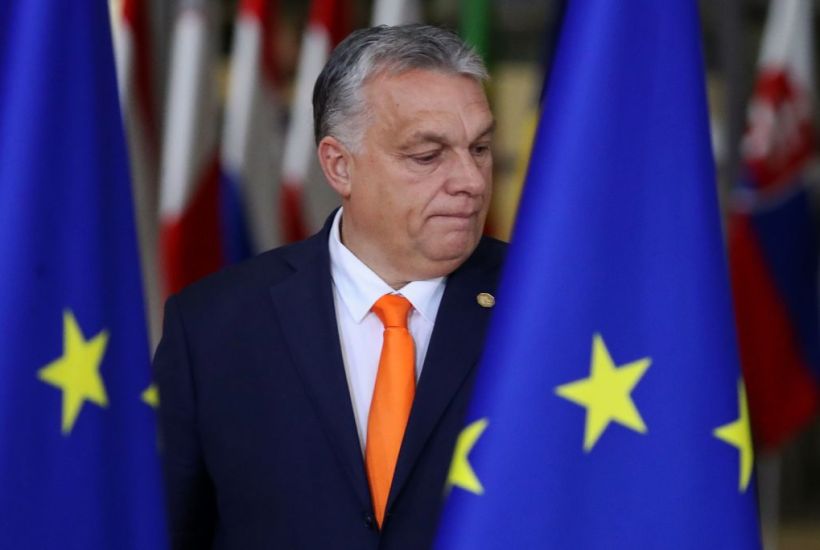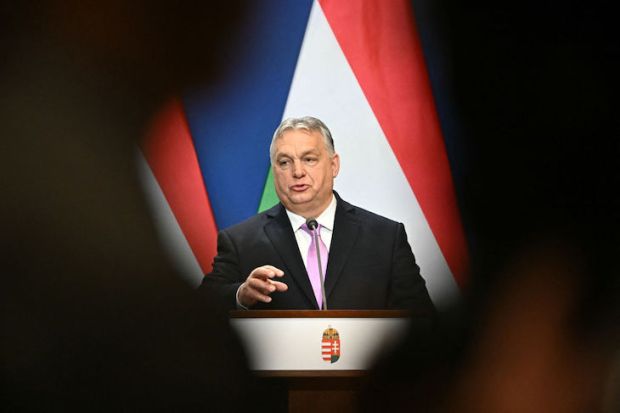‘Times have changed, and whereas thirty years ago we believed Europe was our future, today we understand that we are Europe’s future’.
Hungarian prime minister Viktor Orbán has never been one to shy away from controversy when it comes to the European Union. But on Hungarian Independence Day on Monday, he went a step further by presenting an alternative vision for the bloc.
Orbán’s plan involves a major restructuring of the European parliament, which he described as a ‘dead-end’ for democracy. He wants to fix the EU’s democratic deficit by building a ‘democracy of democracies based on European nations’.
In practice, this would mean a reformed European parliament consisting of delegates from national parliaments, replacing the direct election of MEPs. Boosting the representation of national democratic bodies would, in Orbán’s view, safeguard member states’ sovereignty; under his proposal, national lawmakers would have the ability to block EU legislation violating national spheres of authority.
Orbán also questioned the democratic legitimacy of European parliamentary elections, arguing that, given the diversity of European societies, the only elections with true democratic legitimacy are national ones involving a culturally and socially unified ‘demos’.
In the context of ever-more-frequent conflicts between Orbán and Brussels, it is unsurprising for the Hungarian leader to propose an increase in member states’ autonomy – and his vision for a reformed European parliament will, no doubt, be laughed off by Brussels politicians. Yet in criticising Europe’s parliament for pursuing its own ideological and institutional interests at the expense of member states’ national sovereignty, Orbán’s speech also highlighted an increasingly hostile attitude towards governments in Central and Eastern Europe – an attitude which, some argue, threatens to undermine democracy in those countries.
The European parliament takes the most punitive stance of any European body when it comes to violations of legal or ethical standards by states such as Hungary and Visegrád Four ally Poland. When the EU’s famous ‘rule of law’ budgetary mechanism was watered down following crunch negotiations between Orbán, Polish PM Mateusz Morawiecki and other EU leaders in December, liberal MEPs tabled a resolution railing against the additional limitations on the EU’s ability to withhold funds for member states.
With the mechanism now set to come into effect, the European parliament is baying for blood – even threatening to take the European commission to the European court of justice over its tardiness in taking action against Poland and Hungary. But in demanding that rule of law proceedings pre-empt legal challenges submitted by those two countries to the ECJ, the EP’s latest threat appears to fly in the face of the very agreement which allowed the mechanism to be approved in the first place.
Poland and Hungary still argue that, by tying the distribution of EU funds to domestic policymaking, the rule of law mechanism interferes with national sovereignty. And concerns about the EP’s increasingly cavalier attitude towards sovereignty are not limited to these two rebel states. A motion passed by the European parliament earlier this month condemned conflicts of interest arising from Czech prime minister Andrej Babiš’s business empire, parts of which are a major recipient of EU farm subsidies. For the European parliament’s critics, this move – which effectively called for the resignation of the country’s democratically-elected leader – was a step too far.
The motion, passed by a huge majority of MEPs, said that doubt about whether excluding Babiš from EU decision-making processes would sufficiently address the problems in hand means ‘resigning from public duty therefore constitutes a more adequate means to fully address the conflict of interest’.
With elections approaching in October, Babiš responded in incendiary style, saying ‘this is a continuation of the EP’s intervention in the internal affairs of the Czech Republic’. Whatever one thinks of the controversial Czech leader, parliamentarians from across Europe calling for the resignation of a national head of government is, surely, an unacceptable encroachment on member states’ democratic sovereignty.
It is also striking that the EP crusade, being led by liberal MEPs from across the bloc, focuses on central and eastern European members with electorates still marked by strong currents of Christian conservatism. As the Czech Pirate party MEP who helped write the anti-Babiš resolution, Mikuláš Peksa, told me:
‘Conflicts of interest are a problem across the European Union. The system can be abused, is being abused, and we need to change the system itself’.
The European parliament may be the bloc’s most democratic institution. But stuck in its own echo chamber, it is unable to grasp that its efforts to enforce common ethical standards risk a very unethical violation of member states’ sovereignty and democratic processes. Orbán’s proposed reforms to the EP won’t be listened to – but they certainly deserve attention.
Got something to add? Join the discussion and comment below.
Get 10 issues for just $10
Subscribe to The Spectator Australia today for the next 10 magazine issues, plus full online access, for just $10.




















Comments
Don't miss out
Join the conversation with other Spectator Australia readers. Subscribe to leave a comment.
SUBSCRIBEAlready a subscriber? Log in